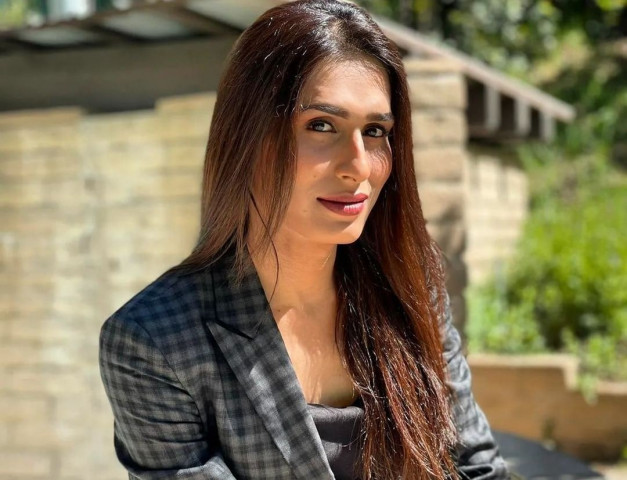After running away from home at the age of 11, Alina Khan has finally found joy in life
The actor said that, while she has many plans post 'Joyland', her primary goal is to buy a house in Pakistan

Actor Alina Khan, who ran away from home at the age of 11, has finally found joy in life - thanks to the incredible success of Joyland. She left home at such a young age to dodge the emotional and physical abuse she was facing for being a Trans child.
In an interview with Marie Claire, the actor opened up about her childhood and how people were constantly questioning her identity while she was exploring it herself. “People were constantly asking me why I am the way I am. At that time, I could not find a way to express that this was not something that I’m doing deliberately nor was this something I was making up,” she said. “It was just me. There were no words to express this or no understanding of who I am or the identity that I have.”
More than a decade later, it was Joyland's director Saim Sadiq’s faith in her acting prowess and the films she did (Darlings and Joyland) that gave her the tools to lay bare her truth and bridge that gap. “Had I seen something like Joyland growing up, it would’ve answered a lot of questions for me about who I am, about my identity,” she said.
“More than [my acting] meaning something to other people, what’s more important is what being a Pakistani trans woman actor means to me. Because it’s only me who can look at my own life and see the difficulty and the hardships that I’ve gone through. I place a lot of value on where I’ve gotten in life and how I’ve, in some sense, made it out.”
Khan revealed that the film also changed her family’s mentality. While the theatrical ban in Lahore prevented her relatives from watching Joyland, they’ve followed her newfound success, even reaching out to congratulate and reconnect with her.
“All those years ago, I ran away from home with this desire to make an identity for myself and to find some space in the world and achieve great things in life,” she said. “Joyland is the reason that I can now, again, resume some healthy relationships with my siblings, my family.”
Regarding her future, the actor has a lot of big and small goals to achieve. From teaching dance to becoming a choreographer to continuing acting, Khan is still figuring her options out but primarily, she wants to be able to buy a house in Pakistan.
She is aware that she can’t make enough of a living on just acting gigs given that mainstream Pakistani media does not have a lot of roles for transgender women but feels that it's still worth giving a shot.
Khan, who worked as a dancer after running away from home, was performing at an NGO event where she met Joyland’s co-producer Sana Jafri, who at the time was working as the casting director on Sadiq’s short film Darling.
Upon what made her sign on the Cannes-winning film, she said it was Sadiq’s vision of Biba and the relatability to her character’s onscreen arc. “It was very attractive that a trans character was being shown as a strong, independent character who could fight for herself and who could stick to her morals and principles,” she exclaimed. “What was most important for Biba was to display her talent in an honourable way, and that honourable way was working at the theatre. For society to appreciate her.
Joyland, for Khan, was all about its subtle but brave way of holding a mirror up to the patriarchal society and exposing its toxic gender stereotypes. “It was all very real, and it came out of this world that we live in. All of the stories [in the movie] individually reflect the truth of this world or of that character or of the moment that they exist in.
But primarily, she is proud of becoming a face that displayed “an honest portrayal of the trans community” on screen as opposed to caricatures that have not only dominated Pakistani media but also Western stories.
Khan shared that Sadiq was very careful about misrepresentation. “He would ask about how I would respond in situations—like the scene in which Biba is discriminated against on public transportation, or when a romantic encounter between Biba and Haider turns sour—to ensure the storytelling felt true to life.”
Khan hopes to see more raw and honest storytelling from Pakistani directors after Joyland. “It has opened up a lot of opportunities for some very good directors in Pakistan to be confident enough to actually write roles for trans people. The mentality of a lot of commercial brands within the country is also going to change. They will begin to see trans people as people who can represent their brands, represent some commercial value in the market,” she concluded.





-(1)1720859193-0/Untitled-design-(83)-(1)1720859193-0-208x130.webp)













COMMENTS
Comments are moderated and generally will be posted if they are on-topic and not abusive.
For more information, please see our Comments FAQ